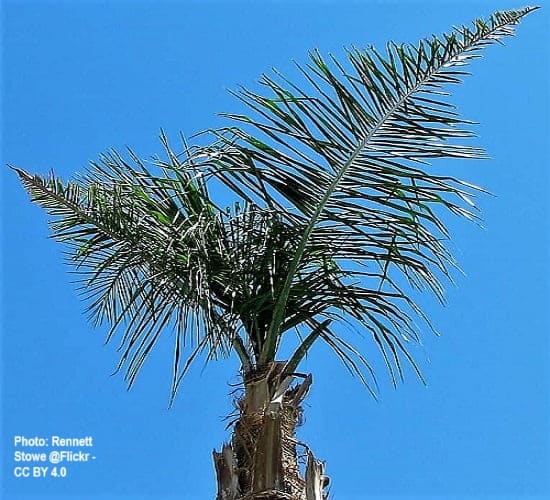- Home
- Caring For Palms
- Palm Nutrients
Palm Tree Nutrients are Essential For Their Health
Palm tree nutrients are needed by Palm Trees for their healthy life's best results. A vital component of Palm Tree Nutritional Care are these sixteen elements. They provide a wide range of functions for palms. If any are lacking, your healthy Palm Tree Will Have Problems and be at risk.
We'll got your help for understanding the Nutritional Needs of Palm Trees. Something you'd want to know. And in fact need to know if you plan on Growing Palms. For success with your yearly fertilization program.
How Palm Tree Care with Elements are Essential
You're wondering about Which Minerals are Essential elements? Palms require both Macronutrients and Micronutrients. We have a suggestion. Because we do this ourselves.
We love consulting Palm Tree Books, written by biologists and/or horticulturists who are palm nutrition specialists. They know their stuff! Do you want to know about fertilizing palms, with a type of blend that provides good overall nutrition?
FTC Disclosure: If you purchase via a link/ ad on this site, we may earn a small royalty. There's no added cost to you. Thanks much for any looks/ orders! Details>
One we definitely recommend is Ornamental Palm Horticulture.
We use that one all the time.
Written by three palm tree experts, who understand the needs of palm landscape plants. We think you'll like the information they provide.
They give you...
- Descriptions of all the necessary palm tree nutrients, including the ideal NPK ratio.
- And also what happens with a palm's specific nutrient deficiencies.
- Plus great photos to see exactly what this type of Palm Tree Problem would look like.
Feeling overwhelmed by palm tree problems or confusing information?
You’re not alone. At Mission: Palm Trees, we help everyday palm lovers understand, grow, care for, and enjoy palms without puzzling jargon or exhausting research.
We do Authentic Research While Making Palm Tree Details Fun to Know
What are Best Palm Tree Nutrients for Good Health?
The primary nutrients for palm trees are typically placed into two groups: Macronutrients & Micronutrients.
An important point is knowing your soil type & pH level. Both greatly affect the ability to absorb & use these needed palm tree nutrients.
Generally, slightly acidic soil pH levels between 6.0 & 7.0 is best. Whether they're new palm trees, or mature palms. Alkaline soil will mean under-fertilized plants. To see if your soil is in that range, Test It Yourself (best to use distilled water, as tap water has its own pH that may affect results). There are Inexpensive Pronged Meters, too. Or better yet, get a soil test at your local extension service.
This film explains the concept well, even though it's directed towards farmers.
Organic fertilizers often have these nutrients.
But giving too much fertilizer, or using fertilizers with the wrong balance for palms can lead to toxic effects. It's critical to use the right fertilizer, balanced for palm trees. Which prioritizes having necessary nutrients in correct proportions.
If a palm is deficient in any essential nutrients, a variety of palm tree problems can happen. Fatality could be the palm's outcome.
 What's Wrong With This Awful Looking, Deformed Palm?
What's Wrong With This Awful Looking, Deformed Palm?Could it be a Micronutrient Deficiency?
Use Macronutrients for Fertilizing Palm Trees
Macronutrients are elements needed in the highest concentration. Those essentials are on palm fertilizer labels, so you can choose a good palm fertilizer with proper nutrient proportions.
You'll note the N-P-K formulation on fertilizer labels. Those requirements are nitrogen (N), potassium (K), & phosphorus (P). These three elements are vital for palm development, health & growth.
Other macronutrients are also high-priority. They are calcium (Ca), magnesium (Mg), & sulfur (S).
 Now, Palms Won't Really Grow From a Fertilizer Container! 😉
Now, Palms Won't Really Grow From a Fertilizer Container! 😉Added to these essentials are also macronutrient elements provided through a palm's regular functions.
- The palm regularly draws in these elements throughout the growing season:
- Water with dissolved nutrients from the soil & carbon dioxide absorbed from the air.
- From these the palm receives the essentials of carbon (C), hydrogen (H) & oxygen (O).
Newest updates at MPT
-
Can Palm Trees Grow Anywhere - Why You Should Know the Answer
Can palm trees grow anywhere is a good question. As some areas where they can grow are surprising. Find out why.
What Macronutrients Do Palms get with Soil & Fertilizer?
Each primary macronutrient plays its part in preventing nutritional deficiencies.
- Nitrogen is essential for palm growth, particularly for the leaves & trunk. High nitrogen fertilizer content (like turf fertilizers) won't do well with palms. Too much nitrogen prevents absorption of other palm tree nutrients.
- Phosphorus aids energy transfer & storage, for good growth.
- Potassium moves within a palm to where it's most needed. Proper potassium fertilizer percentage ratio helps regulate water & nutrient movement.
Other macronutrients also make important contributions for all species of palms.
- Calcium is vital for cell wall development, especially for fronds.
- Magnesium aids the process of photosynthesis.
- Sulfur for healthy growth of palm fronds & protein production.
Then What are the Palm Tree Micronutrients?
Micronutrients are also called trace elements. Because palms need these necessary nutrients in minute quantities - just traces. Because palms need these in minute quantities - just traces. If the palm doesn't have them in required amounts, they'll suffer & can even die.
Palm trace elements include iron (Fe), manganese (Mn), zinc (Zn), copper (Cu), molybdenum (Mo), boron (B), and chlorine (Cl). They each have a role to play.
- Boron is required for normal growth & cell division. It also aids sugar transport.
- Iron is a prime element promoting chlorophyll production. But it needs well-aerated soil to do it's job well.
- Manganese is important for chlorophyll action, helping maintain healthy chloroplasts.
- Zinc aids in enzyme function
- Copper is essential for various metabolic processes affecting good maintenance of green leaves.
- Molybdenum & Chlorine help provide beneficial growth for new leaves.
Palms With Nutritional Palm Tree Problems
We've seen how nutrients are essential to palm health. Without all necessary nutrients, palms can face lethal conditions.
After viewing symptoms, along with Your Local Soil Analysis, figure out your palm's best fertilizer. Many symptoms are similar, when there's lack of any essential nutrients. Consider a professional diagnosis from a Certified Arborist near you. Preferably those who are palm nutrition experts.
But we have diagnostic starting point hints for you.
Care of Macronutrient Fertilizer Palm Tree Deficiencies
- Potassium deficiency - Likely the most common deficit for Outdoor Palms. Especially in the tropics. Can be deadly if not solved. Symptoms may be confusing as they're not always the same. Mostly it's a filmy yellowing of the palm frond (chlorosis). With spotting throughout the lower fronds.
 Chlorosis Throughout the Frond
Chlorosis Throughout the Frond- Phosphorus - Symptoms similar to N-deficiency, beginning with the oldest leaves. Palms in tropical acidic soils can face this problem.
- Nitrogen - Without enough, new growth palm fronds turn very light green, then yellow, finally to white. Then growth stops. Yet, overdoing Nitrogen isn't good either.
 Potted Palm Showing Nitrogen Deficiency
Potted Palm Showing Nitrogen Deficiency- Calcium - Lack of this element is very rare for outdoor palms. Sometimes occurs with potted palms. Normal palm-shaped new leaves become underdeveloped, with dead sections. Add dolomite to potting soil to avoid.
- Sulfur - Deficiency has happened locally in Florida Palm Trees. Youngest leaves appear chlorotic. Then get necrotic, with brown/black tips. Mulching with organic matter provides this element.
- (Mg): Magnesium - Happens outdoors in sandy soils, or in potted palms. Older leaves/leaflets show yellow stripes near the edges. Eventually leaf tip necrosis.
 Magnesium Deficiency Symptoms Have Begun to Show on Older Bottle Palm Fronds
Magnesium Deficiency Symptoms Have Begun to Show on Older Bottle Palm FrondsThe Tips Turn Yellow Gold Along the Margins
Most Common Deficiencies With Palm Tree Micronutrients
- (Mn): Manganese - More common in palms planted in sandy ground. New leaves abnormally small & yellow with brownish/black streaks. Finally frond/leaflet ends curl up wrinkly, like frizzy hair. Described as "frizzletop."
- (Fe):Iron - More common problem with Indoor Palms. Young leaf size may be stunted. Plus yellow coloring between veins.
 Iron Deficiency Signs - Chlorotic leaf color between green veins.
Iron Deficiency Signs - Chlorotic leaf color between green veins.In This Fishtail Palm (Caryota mitis)
- Boron - Occurs in palms from varied climates. New growth frond leaflets stick together. Distorting leaf blades with wrinkles. Eventually stunted leaf size & palm growth. Untreated, it's a fatal problem.
 Scrawny fronds from Boron Deficiency
Scrawny fronds from Boron DeficiencyIn this Syagrus romanzoffianum - a Queen Palm
 Scant Boron Causes New Spear Apical Growth Deformity.
Scant Boron Causes New Spear Apical Growth Deformity.Fronds All Twisted Up!
How Actions & Fertilizers Affect Palm Tree Nutrients
Nutrient absorption can be affected by the palm tree's treatment.
- Toxic substances, like too much good fertilizer. Or the wrong kind of fertilizer.
- Or leaching of some type of poisonous substance, like weed killer, etc., getting into the Palm Root System.
- Nutritional needs of Macro/Micro elements lacking because of Not Pruning Correctly.
Takeaways for palm tree Nutrients
Providing palm trees with necessary nutrients is a critical aspect for best results. Soil test, proper fertilization, and knowing signs of specific nutrient deficiencies can help prevent problems that you & your palm don't need.
Some nutritional deficiencies may be confusing. Symptoms look the same as many diseases. Still, awareness of the varieties of nutritional problems is important. Learning about needed elements will help you promote the health of your palm trees.
It's good advance preparation for their care. Knowing that addressing problems quickly can easily get it solved. If you can do that as soon as you suspect it, your palm can likely recover.
We hope we gave you helpful info to get you started on these nutritional problems.







